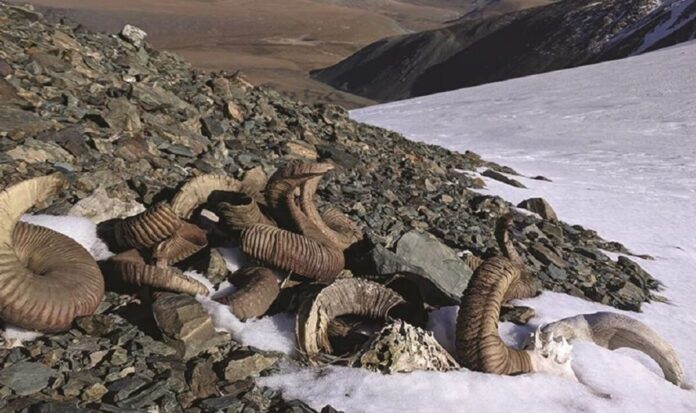Climate change is amplifying the risks to the archaeological record – threatening both undiscovered and artefacts and well-known with irreparable damage. This is the warning of an international team of researchers who have published a series of four papers in the journal Antiquity highlighting examples of this problem and calling for efforts to protect our cultural heritage around the globe. Human-made climate change, they note, is leading to rising temperatures, shifting precipitation patterns and increasing extreme weather events – putting at risk the very conditions like wetlands, oceans and ice patches that best preserve artefacts and remains.Physical geographer Dr Jørgen Hollesen of the National Museum of Denmark is an author on all four papers.He said: ‘Climate change is accelerating, amplifying existing risks and creating new ones – the consequences of which could be devastating for the archaeological record.’However, from a global perspective, very little is being done to protect the archaeological record from climate change.’To make matters worse, the researchers note, the conditions that have led to some of the world’s best-preserved artefacts are also facing some of the greatest threats. Pictured: sheep remains emerge from a glacier as a result of climate change (Image: W. Taylor & P. Bittner)One example of an artefact of a class we may no longer see in the future, should climate change continue unchecked, is the so-called Tollund Man.The remains of this individual – who lived more than two millennia ago and appeared to have been hung as sacrifice – were found so well preserved in a Danish bog that scientists were even able to reconstruct his last meal (porridge!) from the material found in his gut.The great thing about wetlands, from an archaeological perspective, is that they create a barrier to oxygen around things that fall into them – inhibiting the action of natural decomposers.Chemist and archaeological preservation expert Professor Henning Matthiesen, also of the National Museum Denmark, said: ‘Organic materials can be preserved for millennia in wetlands.’Wetland archaeology has been under pressure for several decades, and wetlands have been destroyed at alarming rates across the world.’ Tollund Man, pictured, was preserved in the kind of bog than climate change threatens (Image: Public Domain)In fact, researchers estimate that around half of the world’s wetlands have been lost – a fact that will likely further exacerbate climate change, as these natural environments are known to serve as carbon sinks.As temperature and precipitation patterns change, it is feared that many of the surviving wetlands will also dry out.For example, research on Glastonbury Lake Village, an Iron Age settlement preserved in wetlands in Somerset has found that the water dropped by almost a foot during the warm summer of 2018 alone.However, Professor Matthiesen has cautioned, all is not lost. He explains: ‘The good news is that it is often possible to influence the local hydrology and protect wetlands.’As they can help sequester carbon, the protection of wetland archaeology and climate change mitigation can go hand-in-hand.’READ MORE: Archaeologists stumble across vital across vital clue about Babylon Pictured: a WW2 wreck in the Northern Mariana Islands before super typhoon Soudelor (Image: J. Carpenter / Western Australian Museum)Other archaeological environments, however, face a less rosy future.As the researchers note, oceans also have the potential to preserve ancient artefacts – but climate change is also placing these underwater discoveries at risk.Rising water temperatures and ocean acidification can accelerate the decay of marine artefacts – while extreme weather events triggered by climate change have the potential to damage archeological artefacts like shipwrecks.In 2015, for example, the super typhoon Soudelor caused significant damage to World War 2 shipwrecks around the Northern Mariana Islands. Pictured: a WW2 wreck in the Northern Mariana Islands after super typhoon Soudelor (Image: J. Carpenter / Western Australian Museum)Archaeologist Dr Tom Dawson of the University of St Andrews said: ‘Climate change is now acting as an accelerator, meaning that decisions need to be taken more quickly, and working in partnerships is essential.’Practical action is required to save something of those sites that have been placed on endangered heritage lists.’Marine archaeologist Professor David Gregory, of the National Museum of Denmark said: ‘You don’t know what you’ve got ’til its gone!’UNESCO [the United Nations Educational, Scientific and Cultural Organization] argues that underwater cultural heritage should be preserved in situ – but is this always realistic?’DON’T MISS:Archaeology breakthrough as WW2-era bomber found off Denmark coast [REPORT]Defence system could ‘change Ukraine war’ and devastate Russia [INSIGHT]Half of UK bread products contain multiple pesticides, analysis shows [ANALYSIS] Pictured: Glastonbury Lake Village, where water levels are falling, and a reconstructed Iron Age hut (Image: Creative Commons / Graham Richards / Martin Bodman)Meanwhile, the researchers have also warned that archaeological concerns are often left out of national plans to deal with climate change.Archaeological conservator Dr Cathy Daly of the University of Lincoln explains: ‘Climate change is a threat to archaeological preservation – both at site and landscape level.’Climate change adaptation is essential, but the heritage sector has been slow to engage with this.’The limited amount of literature that exists on the subject is mostly focussed on Europe and North America.’Reviewing the climate adaptation plans lodged with the United Nations Framework Convention on Climate Change for low- and middle-income countries, Dr Daly and her colleagues found that while around half made provisions for the protection of archaeological or cultural heritage sites, they were typically scant on details of how to achieve such.Dr Daly added: ‘There is awareness of climate change adaptation for cultural heritage in these countries, but actions are not yet widespread.’She concluded: ‘Global climate change is a shared challenge and the best route to finding solutions will be in sharing knowledge.’The full findings of the studies were published in the journal Antiquity:
Climate change is threatening our archaeological record, experts warn
Sourceexpress.co.uk
RELATED ARTICLES


